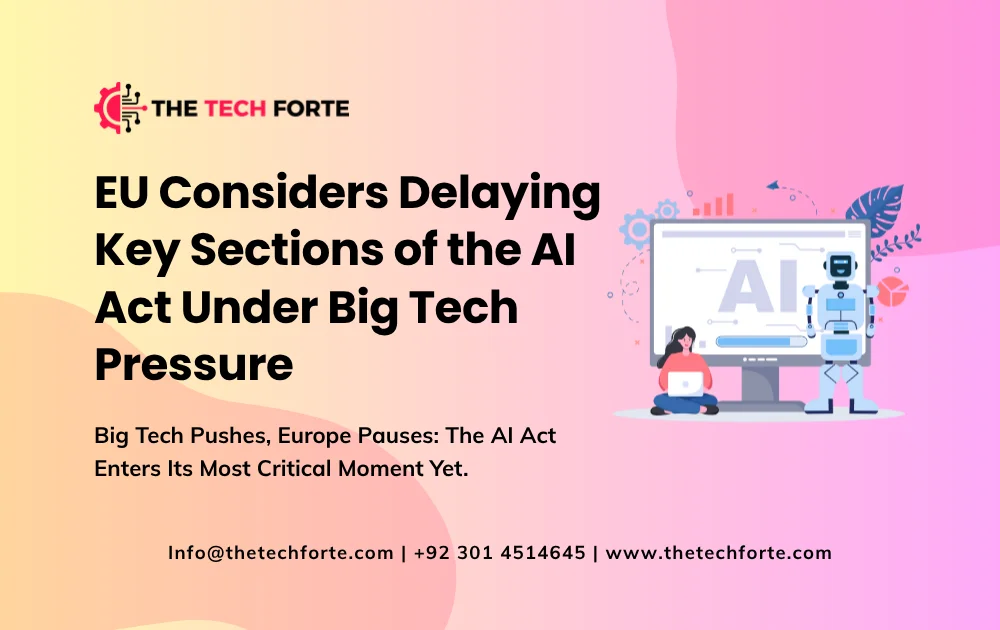
EU Considers Delaying Key Sections of the AI Act Under Big Tech Pressure
In November 2025, the European Union found itself at a regulatory crossroads: under mounting pressure from U.S. tech giants and political forces, Brussels is reportedly considering pausing or delaying critical portions of its landmark AI Act. Big Tech companies like Meta and Alphabet, alongside voices from the Trump administration, have pushed back against parts of the law, triggering internal debates within the European Commission. While no final decision has yet been made, the proposal has sparked fierce discussion on innovation, risk, and Europe’s role in global AI governance.
This article unpacks what’s driving the potential shift, the key battlegrounds, reactions from startups and politicians, and what it could mean for the future of AI regulation in Europe.
Recommended Read: Big Tech Lobbying Push Forces EU to Soften AI Regulation: What That Means for U.S. Firms
Background: What Is the AI Act and Why Does It Matter
- The AI Act, first agreed upon in various forms in 2023, is a pioneering piece of legislation aimed at regulating artificial intelligence in the European Union.
- It introduces a risk-based framework: certain uses of AI are deemed “high-risk” (e.g., healthcare, transport, critical infrastructure) and face strict obligations on transparency, conformity assessments, and human oversight.
- The law officially came into force in August 2024, but many of its most stringent provisions are phased to take effect in 2026 or later.
- The Act represents a major step in setting global standards for trustworthy AI, and many observers expected it to reinforce Europe’s “Brussels Effect” in tech governance.
What’s Driving the Pressure: Why Big Tech & U.S. Voices Are Pushing Back
Calls from Big Tech
- Large tech companies, notably Meta and Alphabet, are urging the EU to slow down the implementation.
- Through CCIA Europe (a lobbying group with members like Alphabet, Apple, and Meta), the tech community argues that the AI Act’s implementation timeline is too aggressive, and the rules are overly complex.
- Specifically, concerns focus on rules for general-purpose AI (GPAI) models, transparency requirements, and the cost and burden of compliance for model providers.
U.S. Political Pressure
- Reports indicate that the Trump administration is also applying pressure, framing the AI Act as potentially harmful to U.S.-based tech firms.
- According to the Financial Times, Brussels has been “engaging” with U.S. officials as part of broader digital regulation talks ahead of a planned simplification package.
- Some U.S. voices reportedly warn that overly strict EU AI rules could provoke trade tensions, especially given the strategic importance of AI.
Proposed Changes: What the EU Is Considering
Brussels is reportedly debating several targeted adjustments to the AI Act, not a wholesale repeal, but significant tweaks:
- “Grace Period” for High-Risk AI
- A one-year delay in enforcement for companies deploying high-risk AI systems.
- According to the draft proposal, firms already deploying certain AI systems could get an extension to adapt without immediate penalties.
- Postponed Fines for Transparency Violations
- Fines for non-compliance with transparency obligations might be delayed until August 2027, giving companies more time to gear up.
- The idea is to ease the burden while firms retrofit their models, documentation, and reporting systems.
- More Flexibility on Monitoring and Compliance
- Officials are reportedly discussing less prescriptive rules for how high-risk AI systems are monitored post-deployment.
- This could shift some obligations from legal mandates to “guidance,” giving developers more leeway.
- Guidance Simplification
- Part of a wider “simplification” package expected around 19 November 2025, aimed at reducing regulatory complexity.
- Such a package may streamline reporting, clarify vague obligations, and align the AI Act with other digital regulations.
Responses & Implications: Innovation, Integrity & Geopolitics
Reaction from European Startups
- Many startup leaders have welcomed the proposed delay. According to Sifted, a one-year grace period could bring “greater certainty” and allow more time to align compliance and innovation.
- For example, Mirakl’s VP called the delay “good news” for responsible AI adoption in Europe.
- But not everyone is cheering: some view the pause as a political concession, raising concerns about caving to U.S. corporate pressure.
Criticism from Regulators & Policymakers
- Several EU lawmakers are warning that watering down the AI Act risks undermining Europe’s leadership and legitimacy in tech governance.
- Critics also argue that making key safety and transparency provisions voluntary could weaken protections for citizens and give U.S. firms a regulatory advantage.
- Some campaigners see the growing U.S. influence as threatening the EU’s ability to implement a genuinely ethical, risk-based framework.
Risks to Regulatory Credibility
- Delays could damage credibility: supporters of strong AI regulation say this could set a precedent undermining the EU’s ability to enforce future rules.
- If the grace period becomes permanent or expanded, parts of the AI Act could lose teeth, particularly in areas like model risk, transparency, and real-world monitoring.
Geopolitical Stakes
- The debate underscores a deeper transatlantic power play: is it possible that U.S. tech firms can shape Europe’s AI rules?
- If Brussels bends under pressure, it may send a signal globally: that regulation is negotiable and can be softened, depending on geopolitical weight.
- For the EU, balancing innovation attractiveness and regulatory sovereignty is a tightrope one that could define its role in the AI race between the U.S. and China.
Potential Scenarios & What Comes Next
Scenario 1: Conditional Delay (“Strategic Pause”)
- The EU agrees to a one-year grace period + delayed fines, but keeps core obligations intact.
- This gives companies time to comply, but the long-term risk (enforcement) remains.
- Likely outcome only if the simplification package is approved by mid-November and backed by member states.
Scenario 2: Significant Softening
- Provisions on transparency, monitoring, or other high-risk requirements are watered down or rewritten.
- This could create a more business-friendly regulatory regime, but may reduce protections and credibility.
- Favorable to Big Tech, but could provoke backlash from rights advocates.
Scenario 3: Pause Backfires Politically
- Delay is interpreted as capitulation to U.S. tech, leading to political blowback inside Europe.
- Risk of fragmentation: some member states may push to reintroduce or tighten rules, or build their own regulatory regimes.
- Could weaken the EU’s regulatory model and its global influence on AI policy.
Scenario 4: No Change: Commission Holds Firm
- The “pause” suggestion is rejected internally; the Commission recommits to the original timeline.
- It could spark more conflict, but maintain the strength of the regulatory framework.
- Would reaffirm the EU’s ambition to lead on safe, ethical AI.
Strategic Implications for Key Stakeholders
For Big Tech (Meta, Alphabet, etc.)
- A delay or pause lowers immediate compliance costs and risk.
- But to win long-term, firms still need robust compliance strategies, since even a delayed AI Act may eventually come into force.
- Strong lobbying now could shape not just the letter of the law, but its enforcement mechanisms.
For European Startups
- More time could mean safer scaling, more clarity, and a lower risk of penalty.
- But uncertainty about the law’s future direction may dampen long-term investment or hiring plans.
- They may also face a tougher future landscape if the Act is reintroduced strongly later, which could tilt competitive balance back to Big Tech.
For EU Policymakers & Regulatory Bodies
- They must weigh innovation retention vs regulatory credibility.
- Delaying now risks weakening enforcement later, but moving too fast risks stifling EU AI ambition.
- The outcome will likely set a benchmark for future digital regulation and impact the EU’s reputation as a regulatory global standard-setter.
For Global AI Governance
- A softened AI Act reduces the strength of Europe’s “Brussels Effect”; its regulatory model may have less global leverage.
- Other regions (U.S., Asia) will closely monitor this episode. If Big Tech can moderate Europe’s AI rulebook, similar regulatory dynamics may surface elsewhere.
- Conversely, the EU might double down in other areas (sandbox regulation, targeted enforcement) to maintain relevance.
Conclusion: A Moment of Reckoning for EU AI Regulation
The reported EU reconsideration of key AI Act provisions marks a critical inflection point. On one side, there is genuine concern from tech firms and the U.S. over innovation costs and compliance timelines. On the other hand, there are existential questions for Europe’s regulatory ambition: will it keep its promise of protecting rights, ensuring safety, and maintaining leadership?
A carefully designed, well-articulated “strategic pause” might be a reasonable compromise. But the risk of over-correction diluting accountability or prioritising big tech over public interest is real. More than that, the decision could set a precedent: whether regulation, even at its boldest, can bend under geopolitical and economic clout.
For the EU, this is not just a policy negotiation; it’s a test of its vision for a future where AI is both powerful and principled. For big tech, it’s a chance to recalibrate regulation to favor scale, but also a warning that regulatory goodwill is fragile, and credibility is hard won.






